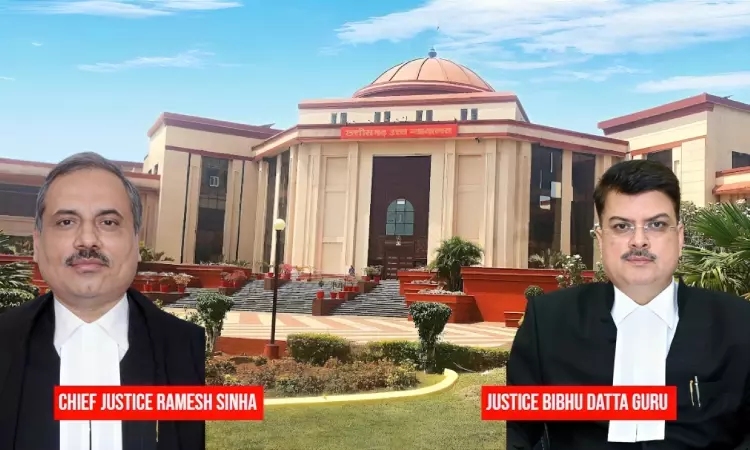- Home
- /
- High Courts
- /
- Chhattisgarh High Court
- /
- Secondary Evidence Of Document...
Secondary Evidence Of Document Can't Be Accepted During Cross-Examination If Suppressed At Earlier Stages: Chhattisgarh High Court
Jyoti Prakash Dutta
19 Jun 2025 2:40 PM IST
The Chhattisgarh High Court has reiterated that secondary evidence in respect of a document can be accepted only if it is established that the original document is lost or destroyed or is being deliberately withheld by the party against whom such document is sought to be proved. It was also held that a trial Court cannot accept a secondary evidence at the instance of a party during...
The Chhattisgarh High Court has reiterated that secondary evidence in respect of a document can be accepted only if it is established that the original document is lost or destroyed or is being deliberately withheld by the party against whom such document is sought to be proved. It was also held that a trial Court cannot accept a secondary evidence at the instance of a party during the cross-examination if it is suppressed during investigation and earlier stages of the trial.
The Division Bench of Chief Justice Ramesh Sinha and Justice Bibhu Datta Guru further clarified that the party which seeks to produce such evidence must prove the 'foundational fact' necessitating production of secondary evidence instead of primary evidence.
“It is trite that under the Evidence Act, 1872 facts have to be established by primary evidence and secondary evidence is only an exception to the rule for which foundational facts have to be established to account for the existence of the primary evidence.”
Case Background
The complainant (Respondent No. 2 herein) lodged a written complaint against the petitioner alleging that he committed sexual intercourse with her on the false pretext of marriage but subsequently, refused to marry her. Therefore, a case for commission of offences punishable under Sections 376 and 417 of the IPC was registered and the police arrested the petitioner.
Upon filing of the charge-sheet, the trial Court framed charges against the petitioner for the aforesaid offences. During the course of cross-examination of the victim, she produced one agreement/ Ikrarnama stating that the same was executed by the petitioner. The trial Court accepted the said document and marked the same as an 'exhibit'.
The petitioner protested the acceptance of such document by the Court since the complainant neither filed any application for taking document on record nor she stated about the same during the course of investigation or at the time of recording of her statements under Sections 161 and 164 of the CrPC.
The petitioner further contended that during cross-examination, a photo-copy of the Ikrarnama was produced by the victim to show that it bears the signature of the petitioner and without any notice the photo-copy was accepted by the trial Court. He argued that acceptance of such document is gross in violation of Section 66 of the Evidence Act as no notice was given to produce such document. Hence, he urged that the High Court must set aside such illegal acceptance of the photo-copy of the agreement.
Court's Observations
The Court perused the provisions under Sections 65 and 66 of the Evidence Act which provide “cases in which secondary evidence relating to documents may be given” and “rules as to notice to produce such secondary evidence” respectively.
Chief Justice Sinha, who authored the judgment, held that for secondary evidence to be admitted, the foundational evidence has to be given i.e. the reasons as to why the original evidence has not been furnished.
“A perusal of Section 65 makes it clear that secondary evidence may be given with regard to existence, condition or the contents of a document when the original is shown or appears to be in possession or power against whom the document is sought to be produced, or of any person out of reach of, or not subject to, the process of the Court, or of any person legally bound to produce it, and when, after notice mentioned in Section 66 such person does not produce it,” he added.
To bolster the above proposition of law, the Court referred to the judgments of the Supreme Court in Ashok Dulichand v. Madahavlal Dube & Anr. (1975) and Rakesh Mohindra v. Anita Beri & Ors. (2015) In the latter case, it was categorically held that unless it is established that the original document is lost or destroyed or is being deliberately withheld by the party in respect of whom the document is sought to be used, secondary evidence cannot be accepted.
In this case, the Court held, the Ikrarnama is not a part of the charge-sheet which was brought to light by the complainant for the first time during her cross-examination. The trial Court also accepted the same without recording the objection of the petitioner that original copy of the said document has not been produced by her, which is per se illegal, improper and contrary to the law laid down by the Supreme Court.
For the above reasons, the petition was allowed and the order passed by the trial Court to the extents of accepting the photocopy of the Ikrarnama produced by the victim/complainant at the time of cross-examination and marking the same as exhibit was quashed.
Case Title: Vijay Uraon v. State of Chhattisgarh & Anr.
Case No: CRMP No. 1108 of 2022
Date of Judgment: June 17, 2025
Counsel for the Petitioner: Mr. Ravindra Sharma, Advocate
Counsel for the Respondents: Mr. Malay Jain, Panel Lawyer for the State; Mr. Vivek Bhakta, Advocate for the Complainant



